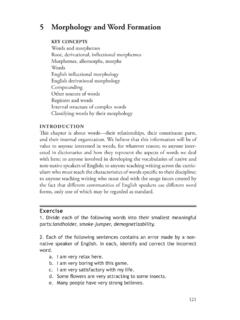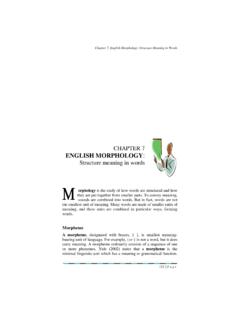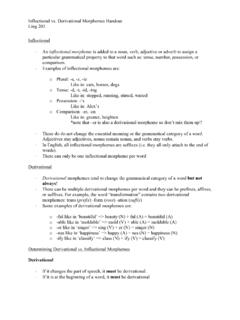Transcription of Morphology – Word Formation and Word Structure
1 Lisa PearlLING200, Summer Session I, 2004 Morphology Word Formation and Word StructureI..carry meaning in addition to a phonological formB..are stored in a speaker s mental dictionary = ..are known as lexemes .D..are the smallest free form in a language that is, the smallest unit where you can leave aspace between it and the next thing when you re writing something ..are made up of morphemes = smallest unit which carries informationa. owls = owl + s (1 word, 2 morphemes). owl = owl , s = more than 1, plural b. complex word = 2 or more morphemes. Ex: owlsc. simple word = 1 morpheme. Ex: owld. free morpheme: can stand on its own. Ex: owle. bound morpheme: can t stand on its own. Ex: s .f. morph = sound form of morpheme (as opposed to the sound + meaning).
2 So, /si/ isthe morph for both the word that means ocean and the word that means look .g. Note: What is free and what is bound varies from language to language. Ex: Justbecause the plural marker is a bound morpheme in English doesn t mean that it s abound morpheme in another Allomorphy = same meaning, but different phonological form (morph)a. a vs. an = one or some . Ex: A fox and an owl walk into a /s/ vs. /z/ vs. / z/ = plural. Ex: /kQts/, /awlz/, /faks z/II. Word StructureA. Root = core of word which carries the major component of meaning. Always belongs to alexical category Noun, Verb, Adjective, Preposition. Example: owl, fly, sly, aboveB. Affix = bound morpheme which adds additional meaning to the word.
3 Can be added to rootor root + other affixes. Ex: -en, -ed, -s, -er, -ation, -ian, -ize, un-, re-C. words are made up of roots and one or more Word Structure examples:Lisa PearlLING200, Summer Session I, 2004 III. Morphological ProcessesA. compounding = putting 2 or more words together to make a new word. Ex: out+house =outhouse, tooth+brush = toothbrush, book+keeper = bookkeeperB. affixation = addition of an affixa. prefix: affix to front of base re+activate = reactivateb. suffix: affix to back of base stark+ly = starklyc. infix: in the middle of the base (only one variant in English) abso + friggin +lutely = abso friggin lutelyC. cliticization = clitics are members of a lexical category which behave like words in meaningand function, but need a host.
4 Ex: They re ( re = are = lexical category V)a. enclitic = attach to end of host. Ex: They re proclitic = attach to the front of host. Ex: (Spanish) Lisa lo ama. = (Lisa him loves).D. internal change = substitution of one nonmorphemic segment for foot feet, goose geese (plural)b. ride rode (past)E. suppletion = replace morpheme with entirely different one for grammatical : be (root) am (present tense)F. reduplication = repeat all or part of base for some contrast in meaningEx: (Turkish) /iji/ = well, /iji iji/ = very well [intensifier]IV. DerivationA. Derivation is an affixal process that forms a word with a meaning and/or category that isdifferent from its base. Derived words become independent : magic + ian magicianB.
5 Examples of derivational affixes. Note: Only suffixes are able to change a word s Akissable, huggable, teasable-mentV Nresentment, enjoyment, retirement-icN Aimbecilic, idyllic, idiotic-izeN Vcrystallize, idolize-enA Vredden, blacken, deaden-nessA Nsilliness, sexinessanti-N Nanti-Bush, antioxidantun-A Aunfair, unclear, unfavorabledis-V VdisrespectC. How to decide the order of affixation. Ex: unhappiness. Is unhappiness = unhappy + ness = (un + happy) + nessb. unhappiness = un + happiness = un + (happy + ness)Look at what the prefix un- attaches to: N? *unhealth, *unfreedom. A? unruffled, , we see that un- likes to attach to Adjectives. We then think that the derivation is(un+happy)+ness rather than un+(happy+ness).
6 Lisa PearlLING200, Summer Session I, 2004V. Compounds Category of compounds determined by rightmost morpheme (known as the head of theword)B. Examplesa. Noun Head i. fire+engine (N+N) = type of engine, not type of fire ii. green+house (A+N) = type of house, not type of green iii. jump+suit (V+N) = type of suit, not type of jumping iv. after+thought (P+N) = type of thought, not type of after b. Verb Head i. spoon+feed (N+V) = type of feeding, not type of spoon ii. dry+clean (A+V) = type of cleaning, not type of dry iii. break+dance (V+V) = type of dancing, not type of breaking iv. over+look (P+V) = type of looking, not type of over c. Adjective Head i. sky+blue (N+A) = type of blue, not type of sky ii. red+hot (A+A) = type of hot, not type of red iii.
7 Over+ripe (P+A) = type of ripe, not type of over C. Compounds vs. Non-compounds: telling the differencea. Stress i. Compounds: stress on 1st component. Ex: bl ckboard. ii. Non-Compunds: stree on 2nd component. Ex: black b Modifiers i. Compounds: can t take modifier on non-head: *a very blackboard. ii. Non-Compunds: can take modifier on non-head: a very black boardD. Endocentric vs. Exocentric Compoundsa. endocentric compound denotes subclass of head. Plural involves making plural ofhead, even if it s irregular. Ex: wisdom teeth = type of teeth, plural teeth rather than*wisdom exocentric compound denotes something else. Plural usually involves standard s plural marker on the end of the entire word. Ex: Walkmans type of men, plural mans rather than * Other Types of Word FormationA.
8 Conversion (zero derivation) = change the category of the word without adding any affixesor otherwise altering the butter (N V)b. survey (V N)c. total (a car) (A V)d. (the) poor (A N)e. down (a beer) (P V)B. clipping = shorten polysyllabic word by deleting 1 or more syllablesa. prof (from professor)b. auto (from automobile)c. porn (from pornography)Lisa PearlLING200, Summer Session I, 2004C. blends = words created from 2 nonmorphemic parts of already existing wordsa. smog (from smoke and fog)b. spam (from spiced and ham)D. backformation = word created by removing a morpheme perceived as an affix from analready existing worda. self-destruction self-destructb. swindler swindlec. pease peaE. acronym = taking the initial letters of 2 or more words and pronouncing those as a singleworda.
9 NASAb. AWOLc. AIDSd. LASERF. onomatopoeia = word which sounds like the thing it namesa. meowb. mooVII. InflectionA. Modification of a word s form to indicate the grammatical subclass to which it belongsa. plural +sb. past +edc. grammatical number (1st, 2nd, 3rd person)d. grammatical gender (masculine, feminine, neuter)e. grammatical case (nominative, accusative, dative, genitive, locative, ablative, etc.)B. Inflection vs. Derivationa. Category Change i. Inflection: does not change category ii. Derivation: may change categoryb. Affixes i. Inflection: can only combine with base after other affixes ii. Derivation: can combine with base before other affixesc. Productive (Can you do it nearly all the time, no matter what the word?)
10 I. Inflection: productive ii. Derivation: non-productiveExercises1. MorphemesFor each word below, state 1) how many morphemes it has, 2) whether it is simple or complex,3) what the root is, 4) what category the root is, 5) what the bound morpheme(s) are, if any. Then draw aderivation : slyest 2 morphemes, complex word, root: sly, category: A, bound morpheme: -estLisa PearlLING200, Summer Session I, 2004a) darknessd) delightfulb) accidentale) prevailc) unbreakablef) unrequited2. Turkish MorphemesConsider the following data from a restaurant /lokantada/ in/at a restaurant /kap / a door /kap da/ in/at a door /randevu/ an appointment /randevuda/ in/at an appointment /baS/ a head /baSt/ in/at a head /kitap/ a book /kitapt/ in/at a book /koltuk/ an armchair /koltukt/ in/at an armchair /taraf/ a side /taraft/ in/at a side a.










